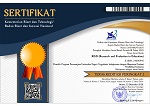Validity and reliability of pre-class reading tasks for waves and optics (PRT-WO)
DOI:
https://doi.org/10.21831/reid.v2i1.8466Keywords:
validity, reliability, pre-readingAbstract
This study aims to produce a valid and reliable instrument in preparing students prior to class at university level of introductory Waves and Optics course. The instrument so called Pre-class Reading Task for Waves and Optics (PRT-WO) was used to probe students' knowledge acquired through targeted reading activities. In practice, PRT-WO was given in a series before actual face-to-face class as a reading assignment. PRT-WO was content validated through expert review which was analyzed using the interrater reliability Cohen's kappa. An item analysis was done to identify inappropriate items further evaluated using the reliability test of Kuder-Richardson 20 (KR20). The finding reveals that the value of kappa is 0.66 and the value of KR20 is 0.68, indicating that the developed instrument is valid and reliable.References
Anastasi, A. & Urbina, S. (1997). Psychology testing (7th ed.). New Jersey, NJ: Prentice Hall.
Bonham, S. (2011). Whole class laboratories with Google Docs. The Physics Teacher, 49(1), 22-23.
Cohen, J. (1960). A coefficient of agreement for nominal scales. Educational and Psychosocial Measurement, 20, 37-46.
Heiner, C.E., Banet, A.I., & Wieman, C. (2014). Preparing students for class: How to get 80% of students reading the textbook before class. American Journal of Physics, 82(10), 989-996.
Henderson, C. & Rosenthal, A. (2006). Reading questions. Journal of College Science Teaching, 35(7), 46.
Hoeft, M.E. (2012). Why university students don't read: What professors can do to increase compliance. International Journal for the Scholarship of Teaching and Learning, 6(2), 12.
Howard, J.R. (2004). Just-in-time teaching in sociology or how I convinced my students to actually read the assignment. Teaching Sociology, 32(4), 385-390.
Ding, L., & Beichner, R. (2009). Approaches to data analysis of multiple-choice questions. Physical Review Special Topics-Physics Education Research, 5(2), 020103.
Fraenkel, J.R., Wallen, N.E., & Hyun, H.H. (1993). How to design and evaluate research in education (Vol. 7). New York, NY: McGraw-Hill.
Kim, D. (2011). Using Google Forms for student engagement and learning. EDUCAUSE Quarterly, 34(1).
Krathwohl, D.R. (2002). A revision of Bloom's taxonomy: An overview. Theory into Practice, 41(4), 212-218.
Landis, J.R. & Koch, G.G. (1977). The measurement of observer agreement for categorical data. Biometrics, 159-174.
Macintosh, H.G. & Morrison, R.B. (1969). Objective testing. London: University of London Press.
Merriam, S. (2001). Qualitative research and case studies in education: Revised and expanded from case study research in education. San Francisco, CA: Jossey Bass.
Moravec, M., Williams, A., Aguilar-Roca, N., & O'Dowd, D.K. (2010). Learn before lecture: A strategy that improves learning outcomes in a large introductory biology class. CBE-Life Sciences Education, 9(4), 473-481.
Philips, G. (1995). Using open book tests to encourage textbook reading in college. Journal of Reading, 38(6), 484.
Podolefsky, N. & Finkelstein, N. (2006). The perceived value of college physics text-books: Students and instructors may not see eye to eye. The Physics Teacher, 44(6), 338-342.
Ryan, T.E. (2006). Motivating novice students to read their textbooks. Journal of Instructional psychology, 33(2), 135-141.
Sabri, S. (2013). Item analysis of student comprehensive test for research in teaching beginner string ensemble using model based teaching among music students in public Universities. International Journal of Education and Research, 1(12), 1-14.
Sikorski, J., Rich, K., Saville, B., Buskist, W., Drogan, O., Davis, S.F., ... & Geller, E.S. (2002). Faculty forum. Teaching of Psychology, 29(4), 312-320.
Stelzer, T., Gladding, G., Mestre, J.P., & Brookes, D.T. (2009). Comparing the efficacy of multimedia modules with traditional textbooks for learning introductory physics content. American Journal of Physics, 77(2), 184-190.
Steven, S.S. (1958). Problems and method of psychophysics. Psychological Bulletin. LV, 177-196.
Young, H.D. & Freedman, R.A. (2013). University physics with modern physics (13th ed.). San Francisco, CA: Pearson Higher Ed.
Supplementary: PRT-WO. Retrieved from https://goo.gl/2mQftJ.
Downloads
Published
How to Cite
Issue
Section
License
The authors submitting a manuscript to this journal agree that, if accepted for publication, copyright publishing of the submission shall be assigned to REiD (Research and Evaluation in Education). However, even though the journal asks for a copyright transfer, the authors retain (or are granted back) significant scholarly rights.
The copyright transfer agreement form can be downloaded here: [REiD Copyright Transfer Agreement Form]
The copyright form should be signed originally and sent to the Editorial Office through email to reid.ppsuny@uny.ac.id

REiD (Research and Evaluation in Education) by http://journal.uny.ac.id/index.php/reid is licensed under a Creative Commons Attribution-ShareAlike 4.0 International License.






.png)





